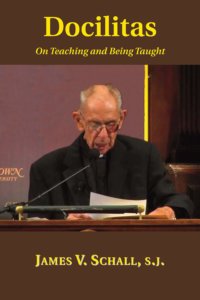Docilitas. On Teaching and Being Taught

Docilitas. On Teaching and Being Taught. James V. Schall. South Bend, IN: St. Augustine’s Press.
Docilitas. On Teaching and Being Taught is a companion work to his book, Another Sort of Learning, where Schall examines what constitutes teaching, learning, and liberal education in today’s universities. Like the other work, Schall both encourages us to think about the fundamental questions of human existence while, at the same time, enjoy the journey while we do so. For Schall, life is not a vale of tears but one of humor, beauty, and goodness that we can discover by both teaching and learning.
The book consists of an introduction, sixteen essays, and an appendix of “fifteen books to be taught.” In the introduction, Schall writes that the art of teaching is to recognize that knowledge is not owned by either the teacher or the student but is free: it is that moment when both parties are able to see the truth of something and thereby both marvel and rejoice at what is discovered. Instead of perceiving teaching as a transmission of information, Schall approaches it as a type of gift or grace that is given by both teacher and student in their mutual pursuit of the truth. And in this journey, both teacher and student becomes something akin to friends by being open to the truth – to be willing and have the capacity to learn something that we did not know before. Hence, the title of the book: Docilitas.
In “The Patron Saint of Teachers,” Schall warns about the dangers of economic utilitarianism and political ideology to liberal education where students should free themselves from these concerns to discover reality as it truly is, a theme that Schall revisits in “Intellectual Resources.” Some other concerns about liberal education Schall cites in “On Teaching”: teaching philosophy too early to students, with the result of making them skeptics; and the promise of technology to replace the professor as a source of information. What teachers can offer is to help students see the world as it is and how it corresponds with the world within the student: why there is something rather than nothing; why is that something not something else; and how does that affect the student’s soul as he or she sees the world.
In “Why Professors Need Students and Other Philosophical Fables,” Schall calls for good will between student and professor, the need for academic standards, and the recognition that knowledge is not owned by anyone as the critical elements for a university to exist. The university is to explore the fundamental questions of human existence rather than providing a boring and narrow education that is characteristic of the Ivy League (“Questions Proper to the University”). It is to seek the truth of reality and its highest goods – whether known by reason, revelation, or both – in a community of teachers and students (“On Teaching and the Highest Good”).
Central to a liberal education is reading, a habit that is not only lost in our culture (“The Reading Room”; “Seneca on Personal Libraries,” “But What Is a Book”) but among today’s students, many of whom are not even taught grammar (“Reading Without Learning”). The result is an illiterate and illiberal culture where liberal education – “the awareness that our minds are measured by reality” – is difficult to sustain, much less to find (99). Although Schall calls for us to read to save our souls (“What Must I Read to be Saved?”), I am less hopeful that such a call will have appeal other than a few who already believe in it. But perhaps this was always the case where isolated islands of liberal education existed in a sea of profit, ideology, and philosophical relativism.
In “Aquinas and the Life of the Mind,” Schall examines the breath and depth of Aquinas’ thought and the problems that confront beginning learners. First, they are not able to identify the important issues (the “multiplication of useless questions, articles, and arguments”); second, they lack discipline; and finally, boredom and confusion reign in their souls (one is reminded of a university’s general education program where students do not know its purpose or how it is related to their studies). To overcome these challenges, students must be willing to learn and to be taught so teachers can direct their studies towards the highest things in reality (“On the Uselessness of Philosophers”; “On Learning and Not Having Learned”; “Docilitas”).
Schall concludes the book with another appeal for students to learn reality as it is and a list of fifteen books to be taught: Sertillanges’ The Intellectual Life, Lewis’ An Experiment in Critcism; Steel’s The Pursuit of Wisdom and Happiness; Sokolowski’s Christian Faith & Human Understanding; L’Amour’s The Education of a Wandering Man; Joseph Pieper – An Anthology; Chesterton’s What’s Wrong with the World; Derrick’s Liberal Education as If the Truth Really Mattered; Schumacher’s A Guide for the Perplexed; Reilly’s Surprised by Beauty; Newman’s The Idea of a University; DelSol’s Icarus Fallen; Bochendski’s Philosophy – an Introduction; Sayers’ The Whimsical Christian; and Schall’s On the Unseriousness of Human Affairs. One could quibble about a book here or there but certainly all of them should be read by those interested in liberal education.
Docilitas is a wonderful book about teaching, learning, and liberal education in today’s universities. Readers will find Schall’s style accessible yet thoughtful, while he thinks about the most fundamental questions of human existence. For those who are either teachers or students today, it is a must read.
Also see our review of James V. Schall’s Another Sort of Learning.




